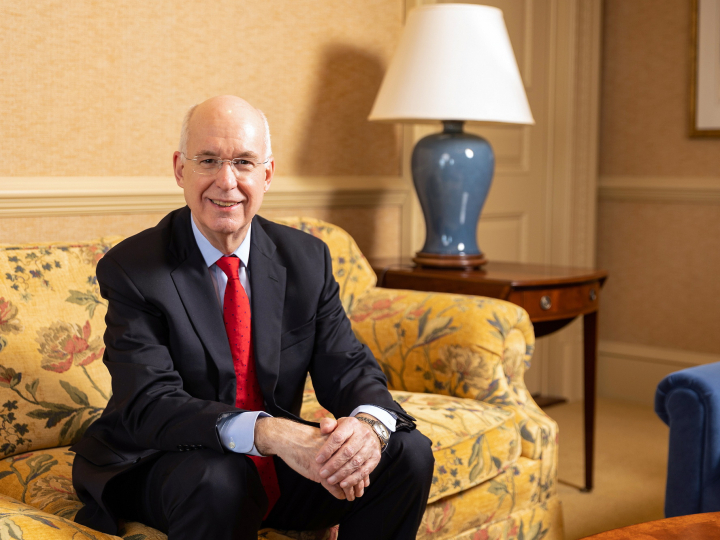Leadership, Support and Excellence
May 15, 2015
Ten years ago, in the fall of 2005, a group of 10 students from Washington, D.C. joined the Class of 2009 at Bucknell University. They hadn't attended the same high school, but they knew each other already. As individuals, they were chosen from more than 600 area applicants to spend eight months developing their already outstanding leadership skills and creating their own support system — a Posse.
The idea behind the The Posse Foundation stemmed from a conversation founder Deborah Bial had while working at a non-profit in New York City in 1989. One student had earned a scholarship, but left college after six months, saying he wouldn't have dropped out if his "posse" had been with him. His words pushed Bial to explore the importance of peer support in college persistence. Over the last 25 years, Posse has become one of the most successful college access and leadership programs in the country, with offices in 10 cities and partnerships with 53 colleges and universities.
When Bucknell decided to become a Posse partner university, there were only five cities and 22 partners and Washington, D.C. had just been established as the newest program. The members of D.C. Posse 1 '09 said they didn't know what it would be like to join the campus community.
"Being the first Posse at Bucknell was like walking into unchartered territory — we didn't have an example of what it meant to be a Posse on campus," said Odinakachi Anyanwu '09. "However, we soon learned it meant being ourselves, supporting each other and leading in our different spheres of interest. It was awesome to see the impact our leadership had on both academic and student life and how that impact rippled outward."
Mark Davies, assistant vice president for enrollment management and director of partnerships, who has coordinated the on-campus program from the beginning, said that when it started, few across campus were familiar with Posse. However, when D.C. Posse 1 was invited to speak at the annual trustee dinner, understanding of the program skyrocketed. "It was no surprise that the students knocked it out of the park," Davies said. "People quickly realized that they were already making an impact."
That impact helped shape the future of the Bucknell-Posse relationship by showing the power of multicultural teams to lead inside and outside the classroom, as well as to facilitate conversations about identity, social issues and diversity. The students reach out across campus to do that through involvement in academic and co-curricular organizations and through the annual Posse Plus Retreat, for which each Posse scholar invites other Bucknell community members to spend a weekend discussing issues like social responsibility, race, education, class, power and privilege. The success of the D.C. program led to establishing a partnership with Boston in 2007 and Los Angeles in 2010, making Bucknell only one of four universities with three or more Posses in each incoming class.
Each group of Posse Scholars go through eight months of pre-collegiate training in their home cities, during which they develop relationships with each other and their Posse trainers in workshops focused on team building and group support, cross-cultural communication, academic excellence, leadership and becoming an active agent of change on campus. During the summer before they arrive for their first year, their Bucknell mentor, a faculty or staff member who meets with the team weekly and each scholar bi-weekly, travels to the students' home city for a summer retreat to meet the group and help them prepare for their transition to college life.
Davies said that mentors often express how their connection with the program has been an important part of shaping their work and perspectives. "It's the single best thing I've done in 35 years at Bucknell," said Professor Elaine Hopkins, French & Francophone Studies, mentor for D.C. Posses 1, 3 and 9. "I've had other roles here, as professor and as associate dean, but this has been different — I've formed real relationships that have turned out to be life-long. They are my family. It's a privilege to work with them."
Lynn Breyfogle, associate dean of arts & sciences and mentor to L.A. Posse 3 '16, said that getting to know the members of her Posse has shaped her work and strengthened her connections with students. "I have phenomenal scholars who are doing great things," she said. "Our Posse includes members who have been inducted into Alpha Lambda Delta National Honor Society, studied abroad and who will graduate summa and magna cum laude. They've participated in fraternities and sororities, civic engagement and student organizations across campus," she said. "And they are just such thoughtful individuals. There is no doubt that Posse Scholars make Bucknell a better place."
Mark Merino, L.A. Posse 4 '17, who is the vice president of the Class of 2017, agrees."Posse has been an entire network of support," he said. "Through Posse I have experienced internship opportunities, inter-city relationships and many speakers and events on topics relevant to a group of leaders like Posse Scholars."
Close to 70 percent of Posse Scholars in the Class of 2015 have been on the Dean's List at least one semester during their time at Bucknell. Five have earned this distinction more than 5 times. They major in everything from English to mechanical engineering and serve as leaders in organizations including Bucknell Student Government, Lambda Chi Alpha fraternity, Students For Asian Awareness at Bucknell and the Society of Hispanic Professional Engineers. They have served as Bucknellian writers, Multicultural Student Services Ambassadors, orientation assistants, residential advisers and tour guides.
To date, 11 Posses have graduated from Bucknell, taking their leadership skills into the work world. Bucknell-Posse alumni reported working as engineers, journalists, management consultants, non-profit leaders, researchers and teachers in the U.S. and in Japan, South Korea and Spain, as well as in the food and beverage, health care and higher education industries, among others. Twenty alumni reported finishing or pursuing master's, law or doctoral degrees.
When D.C. Posse 10 '18 talked about being the bearers of the 10-year Posse legacy, they expressed excitement and humility. They said that while they face some of the same challenges as D.C. Posse 1, they are creating their own mark on each other and on Bucknell. Their academic interests range from international relations to biomedical engineering and their leadership is already contributing to the Black Student Union, the Bucknellian, Bucknell Student Government, Latin@Alliance for Community and Opportunity and campus conversations about race, crime and punishment and respect.
As the end of their first year arrives, they admit that some of them were skeptical about whether or not coming to Bucknell as a Posse would really make a difference for them. Their conclusion? "We can't imagine what it would have been like without each other or the eleventh member of our Posse, our mentor, Karen Marosi, associate dean of engineering," they said. "We all have our own personalities and our interests and involvement are different, but we support each other and celebrate our accomplishments together."
They'll be busy this summer doing things like working on a gospel album and teaching underserved middle-school students to prepare them for college, so they'll have a lot to celebrate when they return to campus in the fall, carrying on the legacy of Posse alumni and passing it on to the Class of 2019.

